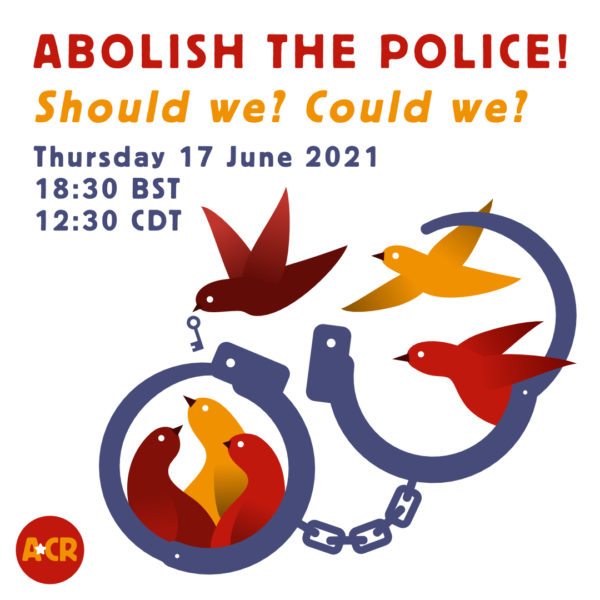Jun
17

6.30pm – 8.00pm
Abolish the Police!
Should we? Could we?
With Dr Adam Elliott-Cooper and Dr Nancy A Heitzeg
17th June 2021 6.30pm-8pm BST (UK)/12.30pm-2pm CDT (US)
Debates about the existence and role of the police and policing have become more visible in recent years, but since the creation of professional police forces there have been people asking what they are for, what they protect, who they serve and who they don’t.
Those who are not served by the police have, from the very beginning and continuing today, not only not been protected by the police, but have been actively persecuted, harassed and even killed by them. Campaigns to reform policing and the criminal legal system often focus on specific incidents (of which there are many), but there is also a significant number of voices challenging the rationale for the existence of the police in the first place.
There is little evidence that the police actively prevent crime, rather than attempting (inasmuch as they do) to ‘solve’ crimes already committed. On this basis, the police can be seen as not only not reducing crime, but as also reproducing existing inequalities.
As identified in the UK by the Macpherson Report, the endemic institutional racism of the police means that this is not, and has not ever been, a question of ‘a few bad apples’. The murders of Joy Gardner, Breonna Taylor, Mark Duggan, George Floyd, among many many others have led campaigners to argue that reforming the police is neither possible nor desirable. The key question for those who would reform the police is how to make it fit for purpose. The key question for those who would abolish the police is what is that purpose anyway.
Calls to defund the police have returned in the US in particular, while in the UK the introduction of Police Community Support Officers in 2002 indicated that even the police themselves recognise that community engagement is crucial. The idea of policing by consent is one proposed by reformists, but could we do without the police entirely? Abolition campaign groups in the UK and in the US have long argued that we can.
Join Anti*Capitalist Resistance on 17th June for a discussion led by long-standing activists and researchers Adam Elliott-Cooper and Nancy A. Heitzeg on the police and policing in the UK and the US, on work to challenge the racism of the police and the prison industrial complex, and on campaigns to reform or abolish the police entirely.
Dr Adam Elliott-Cooper (@adamec87) is Research Fellow in Sociology at University of Greenwich in London. His current research focuses on anti-racism and British policing, both on the British mainland and in Britain’s colonies. Adam is currently running a short course on Racism, Anti-Racism and Policing in Britain and is a member of the Centre for Applied Sociology Research. He is on the board of The Monitoring Group, an anti-racist organisation challenging state racisms and racial violence, and is the author of Black Resistance to British Policing.
Dr Nancy A Heitzeg (@naheitzeg) is Professor of Sociology and Director of the interdisciplinary Critical Studies of Race/Ethnicity Program at St Catherine University in Minnesota. She currently is the Endowed Chair in the Sciences, engaged in a three-year action research project, Challenging Criminalization: Beyond Policing and Punishment. Professor Heitzeg has written and presented widely on issues of race, class, gender, and social control with particular attention to the school to prison pipeline and the prison industrial complex. She is the author of The School-to-Prison Pipeline: Education, Discipline, and Racialized Double Standards (Praeger, 2016) and Carceral Con: The Deceptive Terrain of CriminalJustice Reform (with Kay J. Whitlock, University of California Press, 2021).
Organised by ACR